冀教版九年级上册Unit 3 Safety单元测试题(含答案)
文档属性
| 名称 | 冀教版九年级上册Unit 3 Safety单元测试题(含答案) | 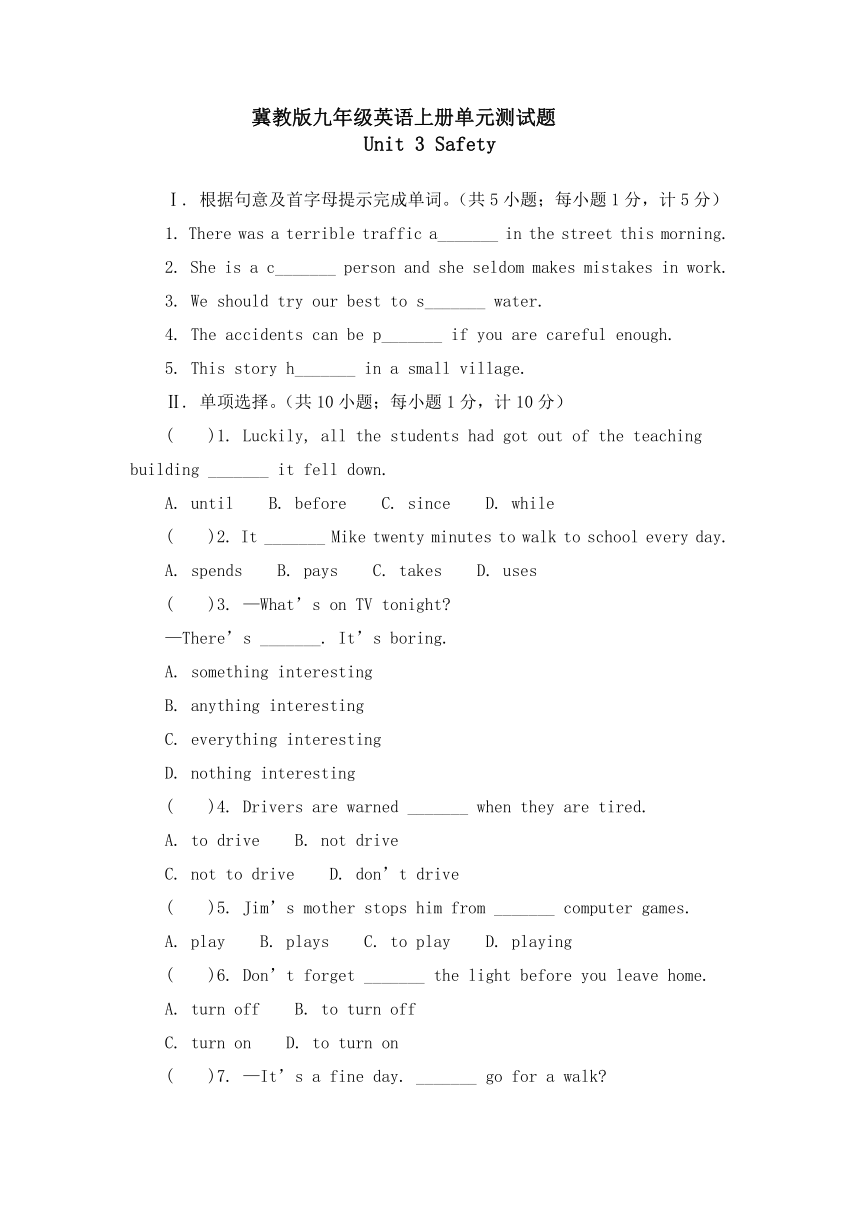 | |
| 格式 | doc | ||
| 文件大小 | 63.1KB | ||
| 资源类型 | 教案 | ||
| 版本资源 | 冀教版 | ||
| 科目 | 英语 | ||
| 更新时间 | 2023-01-06 20:14:17 | ||
图片预览

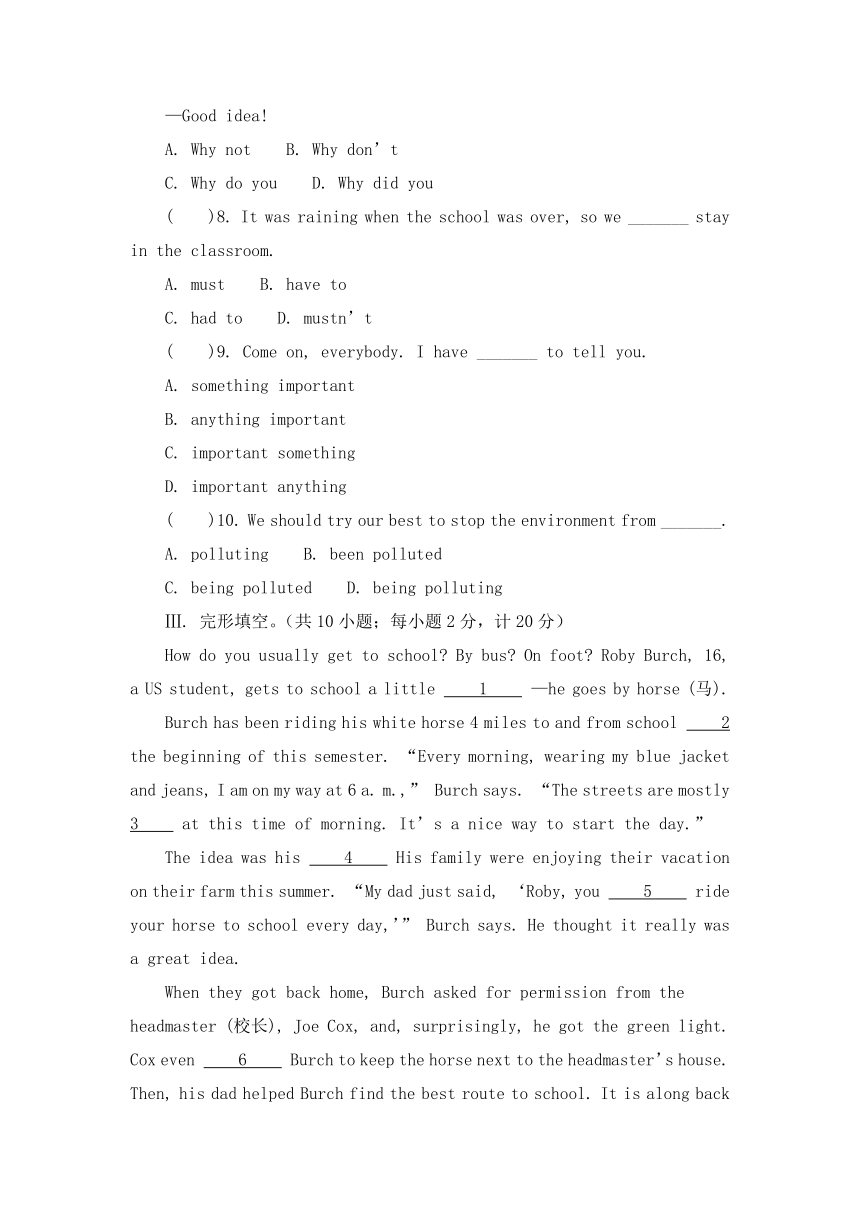
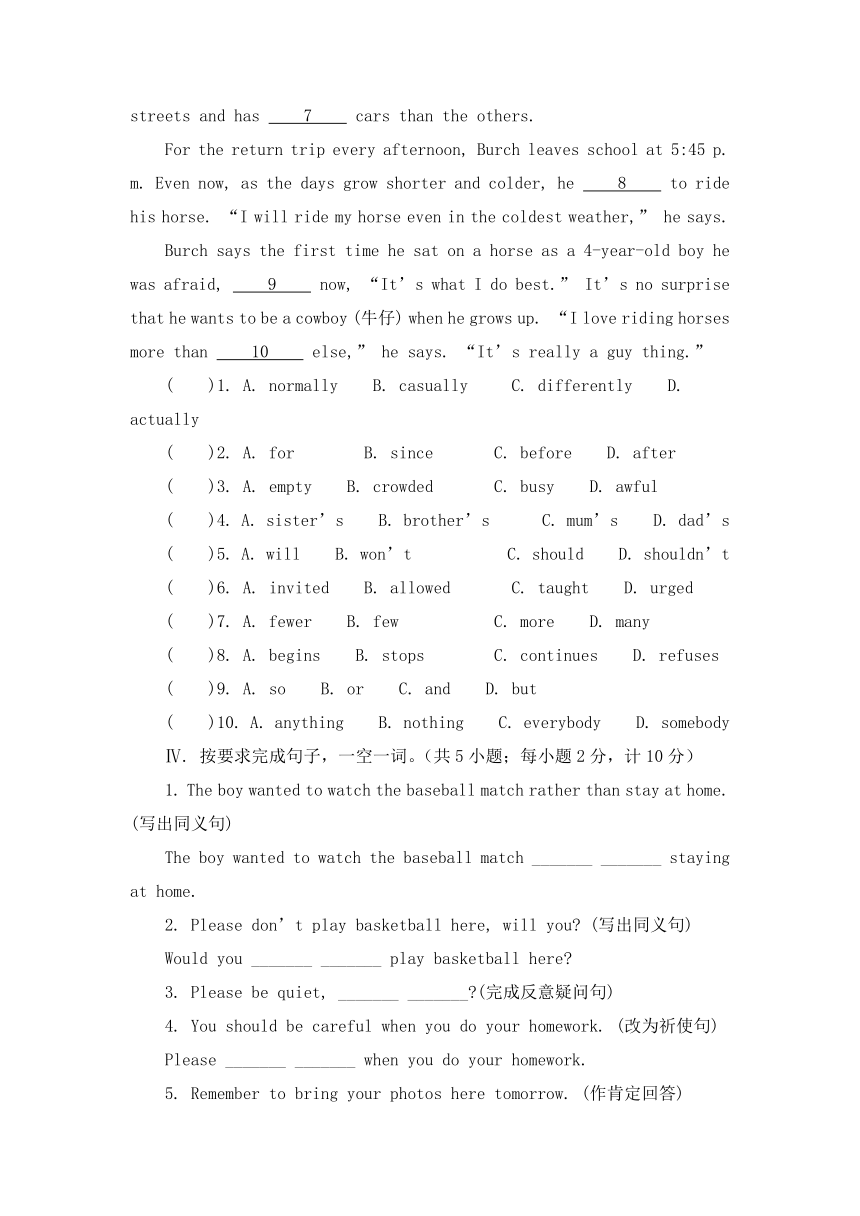
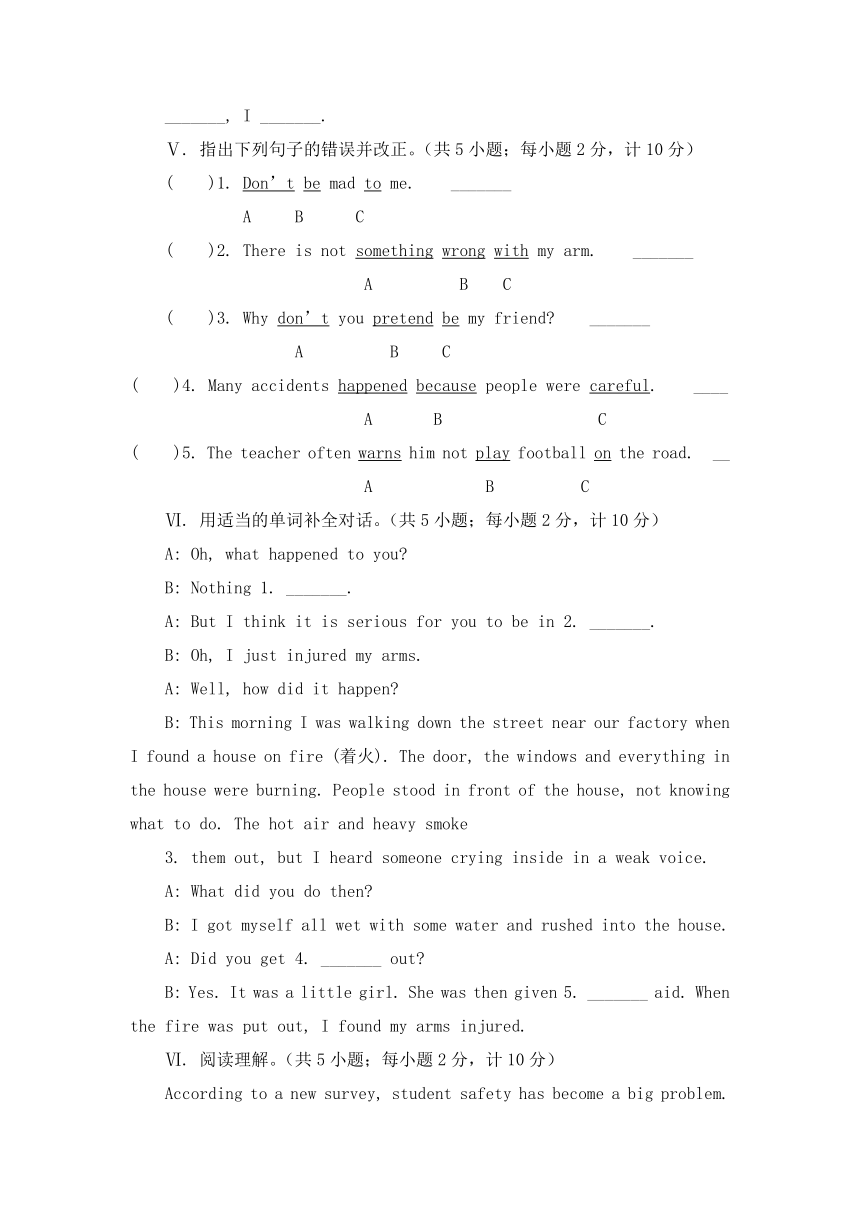
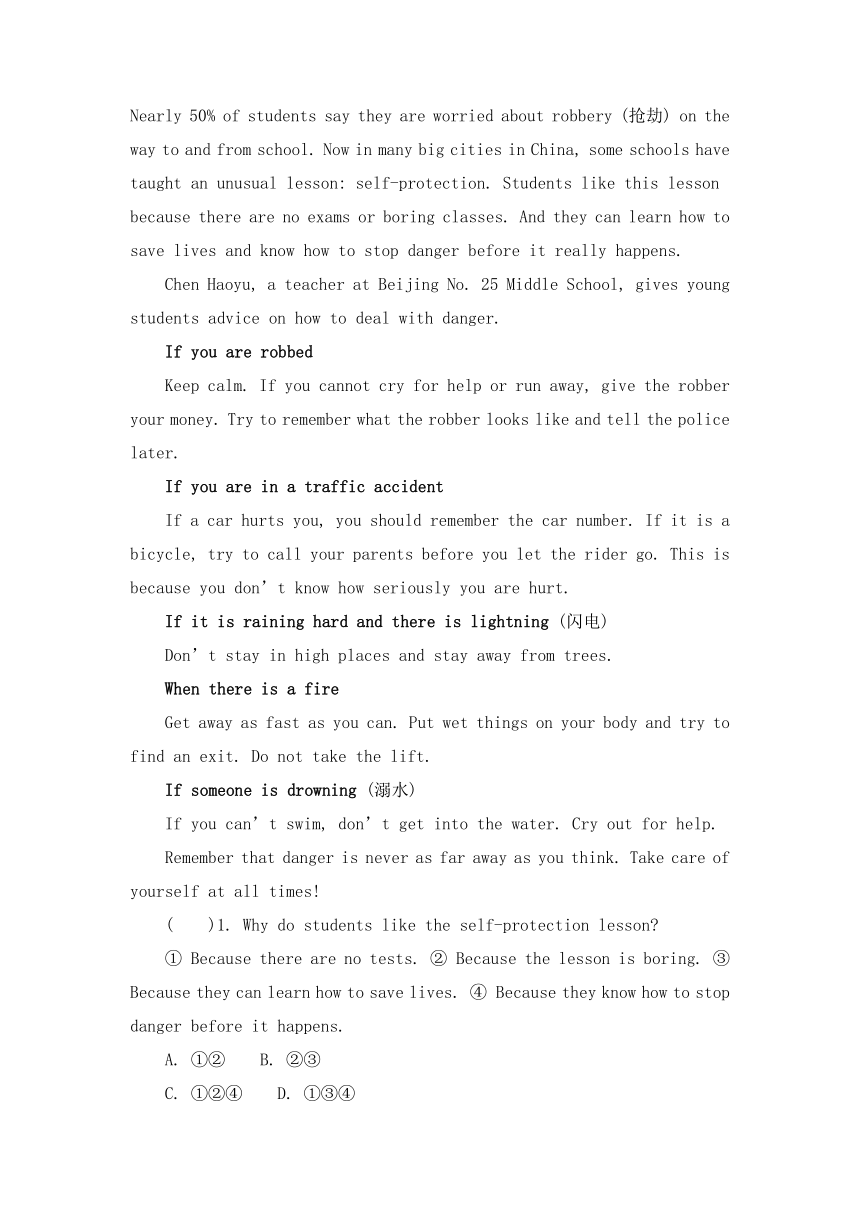
文档简介
冀教版九年级英语上册单元测试题
Unit 3 Safety
Ⅰ. 根据句意及首字母提示完成单词。(共5小题;每小题1分,计5分)
1. There was a terrible traffic a_______ in the street this morning.
2. She is a c_______ person and she seldom makes mistakes in work.
3. We should try our best to s_______ water.
4. The accidents can be p_______ if you are careful enough.
5. This story h_______ in a small village.
Ⅱ. 单项选择。(共10小题;每小题1分,计10分)
( )1. Luckily, all the students had got out of the teaching building _______ it fell down.
A. until B. before C. since D. while
( )2. It _______ Mike twenty minutes to walk to school every day.
A. spends B. pays C. takes D. uses
( )3. —What’s on TV tonight
—There’s _______. It’s boring.
A. something interesting
B. anything interesting
C. everything interesting
D. nothing interesting
( )4. Drivers are warned _______ when they are tired.
A. to drive B. not drive
C. not to drive D. don’t drive
( )5. Jim’s mother stops him from _______ computer games.
A. play B. plays C. to play D. playing
( )6. Don’t forget _______ the light before you leave home.
A. turn off B. to turn off
C. turn on D. to turn on
( )7. —It’s a fine day. _______ go for a walk
—Good idea!
A. Why not B. Why don’t
C. Why do you D. Why did you
( )8. It was raining when the school was over, so we _______ stay in the classroom.
A. must B. have to
C. had to D. mustn’t
( )9. Come on, everybody. I have _______ to tell you.
A. something important
B. anything important
C. important something
D. important anything
( )10. We should try our best to stop the environment from _______.
A. polluting B. been polluted
C. being polluted D. being polluting
Ⅲ. 完形填空。(共10小题;每小题2分,计20分)
How do you usually get to school By bus On foot Roby Burch, 16, a US student, gets to school a little 1 —he goes by horse (马).
Burch has been riding his white horse 4 miles to and from school 2 the beginning of this semester. “Every morning, wearing my blue jacket and jeans, I am on my way at 6 a. m.,” Burch says. “The streets are mostly 3 at this time of morning. It’s a nice way to start the day.”
The idea was his 4 His family were enjoying their vacation on their farm this summer. “My dad just said, ‘Roby, you 5 ride your horse to school every day,’” Burch says. He thought it really was a great idea.
When they got back home, Burch asked for permission from the headmaster (校长), Joe Cox, and, surprisingly, he got the green light. Cox even 6 Burch to keep the horse next to the headmaster’s house. Then, his dad helped Burch find the best route to school. It is along back streets and has 7 cars than the others.
For the return trip every afternoon, Burch leaves school at 5:45 p. m. Even now, as the days grow shorter and colder, he 8 to ride his horse. “I will ride my horse even in the coldest weather,” he says.
Burch says the first time he sat on a horse as a 4-year-old boy he was afraid, 9 now, “It’s what I do best.” It’s no surprise that he wants to be a cowboy (牛仔) when he grows up. “I love riding horses more than 10 else,” he says. “It’s really a guy thing.”
( )1. A. normally B. casually C. differently D. actually
( )2. A. for B. since C. before D. after
( )3. A. empty B. crowded C. busy D. awful
( )4. A. sister’s B. brother’s C. mum’s D. dad’s
( )5. A. will B. won’t C. should D. shouldn’t
( )6. A. invited B. allowed C. taught D. urged
( )7. A. fewer B. few C. more D. many
( )8. A. begins B. stops C. continues D. refuses
( )9. A. so B. or C. and D. but
( )10. A. anything B. nothing C. everybody D. somebody
Ⅳ. 按要求完成句子,一空一词。(共5小题;每小题2分,计10分)
1. The boy wanted to watch the baseball match rather than stay at home. (写出同义句)
The boy wanted to watch the baseball match _______ _______ staying at home.
2. Please don’t play basketball here, will you (写出同义句)
Would you _______ _______ play basketball here
3. Please be quiet, _______ _______ (完成反意疑问句)
4. You should be careful when you do your homework. (改为祈使句)
Please _______ _______ when you do your homework.
5. Remember to bring your photos here tomorrow. (作肯定回答)
_______, I _______.
Ⅴ. 指出下列句子的错误并改正。(共5小题;每小题2分,计10分)
( )1. Don’t be mad to me. _______
A B C
( )2. There is not something wrong with my arm. _______
A B C
( )3. Why don’t you pretend be my friend _______
A B C
( )4. Many accidents happened because people were careful. ____
A B C
( )5. The teacher often warns him not play football on the road. __
A B C
Ⅵ. 用适当的单词补全对话。(共5小题;每小题2分,计10分)
A: Oh, what happened to you
B: Nothing 1. _______.
A: But I think it is serious for you to be in 2. _______.
B: Oh, I just injured my arms.
A: Well, how did it happen
B: This morning I was walking down the street near our factory when I found a house on fire (着火). The door, the windows and everything in the house were burning. People stood in front of the house, not knowing what to do. The hot air and heavy smoke
3. them out, but I heard someone crying inside in a weak voice.
A: What did you do then
B: I got myself all wet with some water and rushed into the house.
A: Did you get 4. _______ out
B: Yes. It was a little girl. She was then given 5. _______ aid. When the fire was put out, I found my arms injured.
Ⅵ. 阅读理解。(共5小题;每小题2分,计10分)
According to a new survey, student safety has become a big problem. Nearly 50% of students say they are worried about robbery (抢劫) on the way to and from school. Now in many big cities in China, some schools have taught an unusual lesson: self-protection. Students like this lesson because there are no exams or boring classes. And they can learn how to save lives and know how to stop danger before it really happens.
Chen Haoyu, a teacher at Beijing No. 25 Middle School, gives young students advice on how to deal with danger.
If you are robbed
Keep calm. If you cannot cry for help or run away, give the robber your money. Try to remember what the robber looks like and tell the police later.
If you are in a traffic accident
If a car hurts you, you should remember the car number. If it is a bicycle, try to call your parents before you let the rider go. This is because you don’t know how seriously you are hurt.
If it is raining hard and there is lightning (闪电)
Don’t stay in high places and stay away from trees.
When there is a fire
Get away as fast as you can. Put wet things on your body and try to find an exit. Do not take the lift.
If someone is drowning (溺水)
If you can’t swim, don’t get into the water. Cry out for help.
Remember that danger is never as far away as you think. Take care of yourself at all times!
( )1. Why do students like the self-protection lesson
① Because there are no tests. ② Because the lesson is boring. ③Because they can learn how to save lives. ④ Because they know how to stop danger before it happens.
A. ①② B. ②③
C. ①②④ D. ①③④
( )2. What will you do if a bicycle hurts you
A. I will remember the bicycle number.
B. I won’t let the rider go until I call my parents.
C. I will let the rider go before I call my parents.
D. I will let the rider go because I know how seriously I am hurt.
( )3. If your house is on fire, you must _______.
A. put dry things on your body
B. run quickly and take the lift
C. run away and find an exit as quickly as you can
D. take everything you have and then run away
( )4. There are _______ ways of self-protection mentioned in the passage.
A. 3 B. 4 C. 5 D. 6
( )5. The best title for this passage is “_______”.
A. How to Keep Calm B. Self-protection
C. An Unusual Lesson D. Danger
Ⅷ. 任务型阅读。(共5小题;每小题2分,计10分)
In the past twenty years, riding bicycles has become more and more popular among people of all ages. Bicycles have long played an important part in the lives of American young people. But today an even greater number of adults cycle along roadsides and bicycle paths. These new riders are often trying to become fit or lose weight. They have found that bicycling is a pleasant way to stay healthy.
This is certainly good for health. But it has also brought some problems. With all these added people on the road, bicycle safety has become a matter of real importance.
Bicycle safety is mostly a matter of common sense. People should ride only on bicycle paths where they will not be badly hurt. There are also a number of rules that riders should follow, especially when riding on streets or highways. Bicyclists should never ride against the traffic, nor should they carry other people on their bicycles. They are also supposed to ride in single line on busy streets and to walk bicycles across the busy intersections (交叉路口). By following these rules, bicycle riders will not only stay healthy but also be safe.
In one recent year, the National Safety Council reported that 34 thousand bicycle riders were hurt in highway accidents. In that same year, another six hundred riders were killed. Since the introduction of crash helmets (头盔) in 1980, the number of injuries (伤者) and deaths from bicycling accidents had gone down. Today, more and more riders realise the dangers of bicycling. They are wearing helmets and paying closer attention to cycling rules.
根据短文内容完成下面的任务。
任务(一):根据短文内容回答问题。
1. How many rules should the riders follow Give one example.
____________________________________________________________
2. According to the National Safety Council’s report, what’s the total number of injuries and deaths in bicycling accidents in one recent year
____________________________________________________________
任务(二):将文中画线部分译成汉语。
3. ____________________________________________________________
4. ____________________________________________________________
任务(三):给短文拟一个恰当的英文标题。
5. ____________________________________________________________
Ⅸ. 书面表达。(计15分)
请用一段连贯的文字,描述下面三幅图中所展示的内容,并根据生活常识,发挥想象力,续写第四幅图可能发生的事情。
注意:不少于80词。
____________________________________________________________
____________________________________________________________
____________________________________________________________
____________________________________________________________
____________________________________________________________
参考答案
Ⅰ. 1. accident 2. careful 3. save 4. prevented 5. happened
Ⅱ. 1. B 2 C 3 D 4 C 5 D 6 B 7 A 8 C 9 A 10 C
Ⅲ. 1. C 2 B 3 A 4 D 5 C 6 B 7 A 8 C 9 D 10 A
Ⅳ. 1. instead of 2. please not 3. will/won’t you 4. be careful 5. Yes; will
Ⅴ.1. C at 2. A anything 3. C to be
4. C careless 5. B to play
Ⅵ. 1. serious 2. hospital 3. kept 4. anyone/anybody 5. first
Ⅶ.1. D 2. B 3. C 4. C 5. B
Ⅷ. 1. A number of rules. Never ride against the traffic. /Don’t carry other people on your bicycles. /Ride in single line on busy streets. /Walk bicycles across the busy intersections.
Thirty-four thousand and six hundred./ 34,600.
3. 很久以来自行车在美国年轻人的生活中扮演了重要角色(起了重要作用)。
4. 通过遵守这些规则,骑自行车的人既能强身健体又能保证自身安全。
5. Bicycle Safety
Ⅸ. One possible version
One evening, when my mother was cooking in the kitchen, the telephone rang. My mother hurried to the living room to answer the phone. She thought she would be back in a minute. But it was an important phone. They talked and talked and my mother completely forgot the cooking. When my mother returned to the kitchen, what did she see
The food in the pan was burning! Smoke clouded the whole kitchen. What could she do At first, she turned off the heat immediately. Then, she took out the cover of the pan and covered it. In a second, the fire was put out. Luckily, there was nothing serious, but the food was burnt. What a pity!
Unit 3 Safety
Ⅰ. 根据句意及首字母提示完成单词。(共5小题;每小题1分,计5分)
1. There was a terrible traffic a_______ in the street this morning.
2. She is a c_______ person and she seldom makes mistakes in work.
3. We should try our best to s_______ water.
4. The accidents can be p_______ if you are careful enough.
5. This story h_______ in a small village.
Ⅱ. 单项选择。(共10小题;每小题1分,计10分)
( )1. Luckily, all the students had got out of the teaching building _______ it fell down.
A. until B. before C. since D. while
( )2. It _______ Mike twenty minutes to walk to school every day.
A. spends B. pays C. takes D. uses
( )3. —What’s on TV tonight
—There’s _______. It’s boring.
A. something interesting
B. anything interesting
C. everything interesting
D. nothing interesting
( )4. Drivers are warned _______ when they are tired.
A. to drive B. not drive
C. not to drive D. don’t drive
( )5. Jim’s mother stops him from _______ computer games.
A. play B. plays C. to play D. playing
( )6. Don’t forget _______ the light before you leave home.
A. turn off B. to turn off
C. turn on D. to turn on
( )7. —It’s a fine day. _______ go for a walk
—Good idea!
A. Why not B. Why don’t
C. Why do you D. Why did you
( )8. It was raining when the school was over, so we _______ stay in the classroom.
A. must B. have to
C. had to D. mustn’t
( )9. Come on, everybody. I have _______ to tell you.
A. something important
B. anything important
C. important something
D. important anything
( )10. We should try our best to stop the environment from _______.
A. polluting B. been polluted
C. being polluted D. being polluting
Ⅲ. 完形填空。(共10小题;每小题2分,计20分)
How do you usually get to school By bus On foot Roby Burch, 16, a US student, gets to school a little 1 —he goes by horse (马).
Burch has been riding his white horse 4 miles to and from school 2 the beginning of this semester. “Every morning, wearing my blue jacket and jeans, I am on my way at 6 a. m.,” Burch says. “The streets are mostly 3 at this time of morning. It’s a nice way to start the day.”
The idea was his 4 His family were enjoying their vacation on their farm this summer. “My dad just said, ‘Roby, you 5 ride your horse to school every day,’” Burch says. He thought it really was a great idea.
When they got back home, Burch asked for permission from the headmaster (校长), Joe Cox, and, surprisingly, he got the green light. Cox even 6 Burch to keep the horse next to the headmaster’s house. Then, his dad helped Burch find the best route to school. It is along back streets and has 7 cars than the others.
For the return trip every afternoon, Burch leaves school at 5:45 p. m. Even now, as the days grow shorter and colder, he 8 to ride his horse. “I will ride my horse even in the coldest weather,” he says.
Burch says the first time he sat on a horse as a 4-year-old boy he was afraid, 9 now, “It’s what I do best.” It’s no surprise that he wants to be a cowboy (牛仔) when he grows up. “I love riding horses more than 10 else,” he says. “It’s really a guy thing.”
( )1. A. normally B. casually C. differently D. actually
( )2. A. for B. since C. before D. after
( )3. A. empty B. crowded C. busy D. awful
( )4. A. sister’s B. brother’s C. mum’s D. dad’s
( )5. A. will B. won’t C. should D. shouldn’t
( )6. A. invited B. allowed C. taught D. urged
( )7. A. fewer B. few C. more D. many
( )8. A. begins B. stops C. continues D. refuses
( )9. A. so B. or C. and D. but
( )10. A. anything B. nothing C. everybody D. somebody
Ⅳ. 按要求完成句子,一空一词。(共5小题;每小题2分,计10分)
1. The boy wanted to watch the baseball match rather than stay at home. (写出同义句)
The boy wanted to watch the baseball match _______ _______ staying at home.
2. Please don’t play basketball here, will you (写出同义句)
Would you _______ _______ play basketball here
3. Please be quiet, _______ _______ (完成反意疑问句)
4. You should be careful when you do your homework. (改为祈使句)
Please _______ _______ when you do your homework.
5. Remember to bring your photos here tomorrow. (作肯定回答)
_______, I _______.
Ⅴ. 指出下列句子的错误并改正。(共5小题;每小题2分,计10分)
( )1. Don’t be mad to me. _______
A B C
( )2. There is not something wrong with my arm. _______
A B C
( )3. Why don’t you pretend be my friend _______
A B C
( )4. Many accidents happened because people were careful. ____
A B C
( )5. The teacher often warns him not play football on the road. __
A B C
Ⅵ. 用适当的单词补全对话。(共5小题;每小题2分,计10分)
A: Oh, what happened to you
B: Nothing 1. _______.
A: But I think it is serious for you to be in 2. _______.
B: Oh, I just injured my arms.
A: Well, how did it happen
B: This morning I was walking down the street near our factory when I found a house on fire (着火). The door, the windows and everything in the house were burning. People stood in front of the house, not knowing what to do. The hot air and heavy smoke
3. them out, but I heard someone crying inside in a weak voice.
A: What did you do then
B: I got myself all wet with some water and rushed into the house.
A: Did you get 4. _______ out
B: Yes. It was a little girl. She was then given 5. _______ aid. When the fire was put out, I found my arms injured.
Ⅵ. 阅读理解。(共5小题;每小题2分,计10分)
According to a new survey, student safety has become a big problem. Nearly 50% of students say they are worried about robbery (抢劫) on the way to and from school. Now in many big cities in China, some schools have taught an unusual lesson: self-protection. Students like this lesson because there are no exams or boring classes. And they can learn how to save lives and know how to stop danger before it really happens.
Chen Haoyu, a teacher at Beijing No. 25 Middle School, gives young students advice on how to deal with danger.
If you are robbed
Keep calm. If you cannot cry for help or run away, give the robber your money. Try to remember what the robber looks like and tell the police later.
If you are in a traffic accident
If a car hurts you, you should remember the car number. If it is a bicycle, try to call your parents before you let the rider go. This is because you don’t know how seriously you are hurt.
If it is raining hard and there is lightning (闪电)
Don’t stay in high places and stay away from trees.
When there is a fire
Get away as fast as you can. Put wet things on your body and try to find an exit. Do not take the lift.
If someone is drowning (溺水)
If you can’t swim, don’t get into the water. Cry out for help.
Remember that danger is never as far away as you think. Take care of yourself at all times!
( )1. Why do students like the self-protection lesson
① Because there are no tests. ② Because the lesson is boring. ③Because they can learn how to save lives. ④ Because they know how to stop danger before it happens.
A. ①② B. ②③
C. ①②④ D. ①③④
( )2. What will you do if a bicycle hurts you
A. I will remember the bicycle number.
B. I won’t let the rider go until I call my parents.
C. I will let the rider go before I call my parents.
D. I will let the rider go because I know how seriously I am hurt.
( )3. If your house is on fire, you must _______.
A. put dry things on your body
B. run quickly and take the lift
C. run away and find an exit as quickly as you can
D. take everything you have and then run away
( )4. There are _______ ways of self-protection mentioned in the passage.
A. 3 B. 4 C. 5 D. 6
( )5. The best title for this passage is “_______”.
A. How to Keep Calm B. Self-protection
C. An Unusual Lesson D. Danger
Ⅷ. 任务型阅读。(共5小题;每小题2分,计10分)
In the past twenty years, riding bicycles has become more and more popular among people of all ages. Bicycles have long played an important part in the lives of American young people. But today an even greater number of adults cycle along roadsides and bicycle paths. These new riders are often trying to become fit or lose weight. They have found that bicycling is a pleasant way to stay healthy.
This is certainly good for health. But it has also brought some problems. With all these added people on the road, bicycle safety has become a matter of real importance.
Bicycle safety is mostly a matter of common sense. People should ride only on bicycle paths where they will not be badly hurt. There are also a number of rules that riders should follow, especially when riding on streets or highways. Bicyclists should never ride against the traffic, nor should they carry other people on their bicycles. They are also supposed to ride in single line on busy streets and to walk bicycles across the busy intersections (交叉路口). By following these rules, bicycle riders will not only stay healthy but also be safe.
In one recent year, the National Safety Council reported that 34 thousand bicycle riders were hurt in highway accidents. In that same year, another six hundred riders were killed. Since the introduction of crash helmets (头盔) in 1980, the number of injuries (伤者) and deaths from bicycling accidents had gone down. Today, more and more riders realise the dangers of bicycling. They are wearing helmets and paying closer attention to cycling rules.
根据短文内容完成下面的任务。
任务(一):根据短文内容回答问题。
1. How many rules should the riders follow Give one example.
____________________________________________________________
2. According to the National Safety Council’s report, what’s the total number of injuries and deaths in bicycling accidents in one recent year
____________________________________________________________
任务(二):将文中画线部分译成汉语。
3. ____________________________________________________________
4. ____________________________________________________________
任务(三):给短文拟一个恰当的英文标题。
5. ____________________________________________________________
Ⅸ. 书面表达。(计15分)
请用一段连贯的文字,描述下面三幅图中所展示的内容,并根据生活常识,发挥想象力,续写第四幅图可能发生的事情。
注意:不少于80词。
____________________________________________________________
____________________________________________________________
____________________________________________________________
____________________________________________________________
____________________________________________________________
参考答案
Ⅰ. 1. accident 2. careful 3. save 4. prevented 5. happened
Ⅱ. 1. B 2 C 3 D 4 C 5 D 6 B 7 A 8 C 9 A 10 C
Ⅲ. 1. C 2 B 3 A 4 D 5 C 6 B 7 A 8 C 9 D 10 A
Ⅳ. 1. instead of 2. please not 3. will/won’t you 4. be careful 5. Yes; will
Ⅴ.1. C at 2. A anything 3. C to be
4. C careless 5. B to play
Ⅵ. 1. serious 2. hospital 3. kept 4. anyone/anybody 5. first
Ⅶ.1. D 2. B 3. C 4. C 5. B
Ⅷ. 1. A number of rules. Never ride against the traffic. /Don’t carry other people on your bicycles. /Ride in single line on busy streets. /Walk bicycles across the busy intersections.
Thirty-four thousand and six hundred./ 34,600.
3. 很久以来自行车在美国年轻人的生活中扮演了重要角色(起了重要作用)。
4. 通过遵守这些规则,骑自行车的人既能强身健体又能保证自身安全。
5. Bicycle Safety
Ⅸ. One possible version
One evening, when my mother was cooking in the kitchen, the telephone rang. My mother hurried to the living room to answer the phone. She thought she would be back in a minute. But it was an important phone. They talked and talked and my mother completely forgot the cooking. When my mother returned to the kitchen, what did she see
The food in the pan was burning! Smoke clouded the whole kitchen. What could she do At first, she turned off the heat immediately. Then, she took out the cover of the pan and covered it. In a second, the fire was put out. Luckily, there was nothing serious, but the food was burnt. What a pity!
同课章节目录
- Unit 1 Stay Healthy
- Lesson 1 What's Wrong,Danny?
- Lesson 2 A Visit to the Dentist
- Lesson 3 Good Food, Good Health
- Lesson 4 Don't Smoke, Please!
- Lesson 5 Jane's Lucky Life
- Lesson 6 Stay Away from the Hospital
- Unit Review
- Unit 2 Great People
- Lesson 7 What Is the Meaning of Lift?
- Lesson 8 A Universe of Thought
- Lesson 9 China's Most Famous "Farmer"
- Lesson 10 Touch the World
- Lesson 11 To China, with Love
- Lesson 12 Guess My Hero!
- Unit Review
- Unit 3 Safety
- Lesson 13 Be Careful,Danny!
- Lesson 14 Accidents Happen
- Lesson 15 My Helmet Saved My Life!
- Lesson 16 How Safe Is Your Home?
- Lesson 17 Staying Safe in an Earthquake
- Lesson 18 Never Catch a Dinosaur
- Unit Review
- Unit 4 Stories and poems
- Lesson 19 A Story or a Poem?
- Lesson 20 Say It in Five
- Lesson 21 The Fable of the Woodcutte
- Lesson 22 The Giant(Ⅰ)
- Lesson 23 The Giant(Ⅱ)
- Lesson 24 Writing a Poem
- Unit Review
- Unit 5 Look into Science
- Lesson 25 Let's Do an Experiment!
- Lesson 26 Keep the Candle Burning
- Lesson 27 Planet Danny
- Lesson 28 The Study of Living Things
- Lesson 29 DNA—The Story of You
- Lesson 30 Science Affects Us
- Unit Review
- Unit 6 Movies and Theate
- Lesson 31 A movie or a Play
- Lesson 32 Moving Pictures
- Lesson 33 The Fisherman and the Goldfish(Ⅰ)
- Lesson 34 The Fisherman and the Goldfish(Ⅱ)
- Lesson 35 Theatres Are Fun!
- Lesson 36 Making Plays Is Fun
- Unit Review
